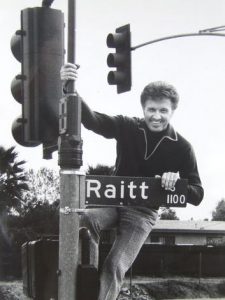Podcast: Play in new window | Download (Duration: 1:18:06 — 87.1MB) | Embed
Subscribe: Spotify | TuneIn | RSS | More
Today I feature as part of my summer series on Great Baritones, one of the greatest Broadway baritones of all time, John Raitt (1917-2005). Wait: did I say one of the greatest? Make that possibly the greatest! Along with Alfred Drake and a handful of others, John Raitt completely redefined the Broadway leading man: strapping, robust, virile, handsome, with an operatic caliber voice and splendid acting chops to match. His creation of the role of Billy Bigelow in Rodgers and Hammerstein’s magnum opus, Carousel, turned a deeply problematic character into a sympathetic one. In this episode we hear excerpts from this role, as well as some of Raitt’s other hits (and non-hits), both on—and away from—Broadway: The Pajama Game, Oklahoma!, Annie Get Your Gun, Three Wishes for Jamie, Show Boat, and others, as well as a bit of opera! I also feature tracks from four of his solo records, recorded and released between 1955 and 1970, which include Neopolitan songs, folk songs, and pure late 60s pop as well as Broadway standards not normally associated with him. Some of his duet partners include Barbara Cook, Rosemary Clooney, Florence Henderson, Doretta Morrow, Anne Jeffreys, as well as his daughter Bonnie, herself one of the great blues singers and guitarists of the late 20th century. We also hear Bonnie’s deeply personal song “Circle Dance,” which concerns their sometimes fraught—but eventually fully reconciled—relationship. Was he really a baritone, was he a tenor masquerading as a baritone, or was he a true “baritenor”? I consider all these possibilities but leave it to my listeners to draw their own conclusions. No matter how you assess John Raitt’s voice, in the end, it sustained him through a career that lasted seven decades; it is a thrill to present him to my listeners in his full baritenorial splendor.
Countermelody is a podcast devoted to the glory and the power of the human voice raised in song. Singer and vocal aficionado Daniel Gundlach explores great singers of the past and present focusing in particular on those who are less well-remembered today than they should be. Daniel’s lifetime in music as a professional countertenor, pianist, vocal coach, voice teacher, and journalist yields an exciting array of anecdotes, impressions, and “inside stories.” Occasional guests from the “business” (singers, conductors, composers, coaches, and teachers) lend their distinctive insights. At Countermelody’s core is the interaction between singers of all stripes, their instruments, and the connection they make to the words they sing. At Countermelody’s core is the interaction between singers of all stripes, their instruments, and the connection they make to the words they sing. Please visit the Countermelody website (www.countermelodypodcast.com) for additional content including artist photos and episode setlists. And please head to my Patreon page at www.patreon.com/countermelody to pledge your monthly support at whatever level you can afford. Bonus episodes available only to Patreon supporters are currently available.
